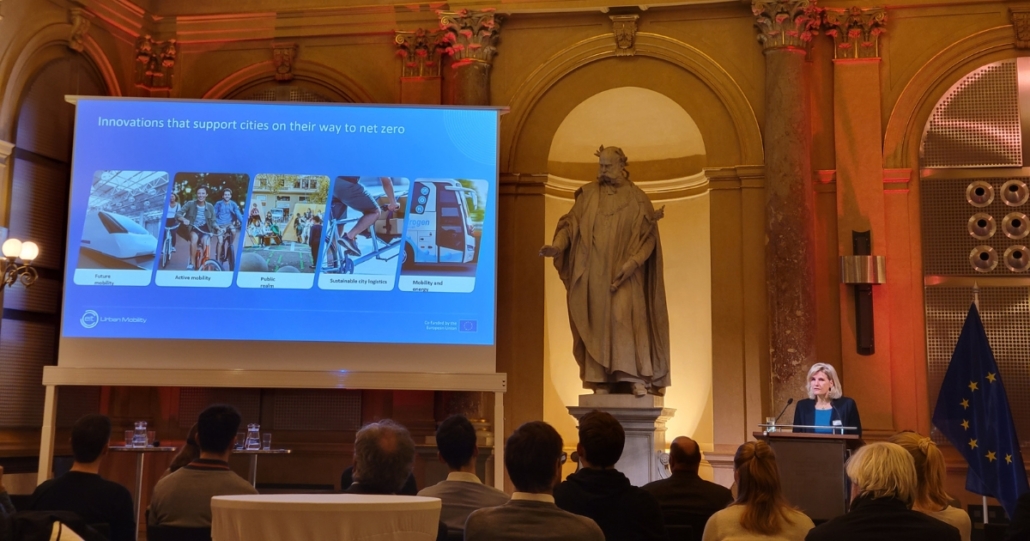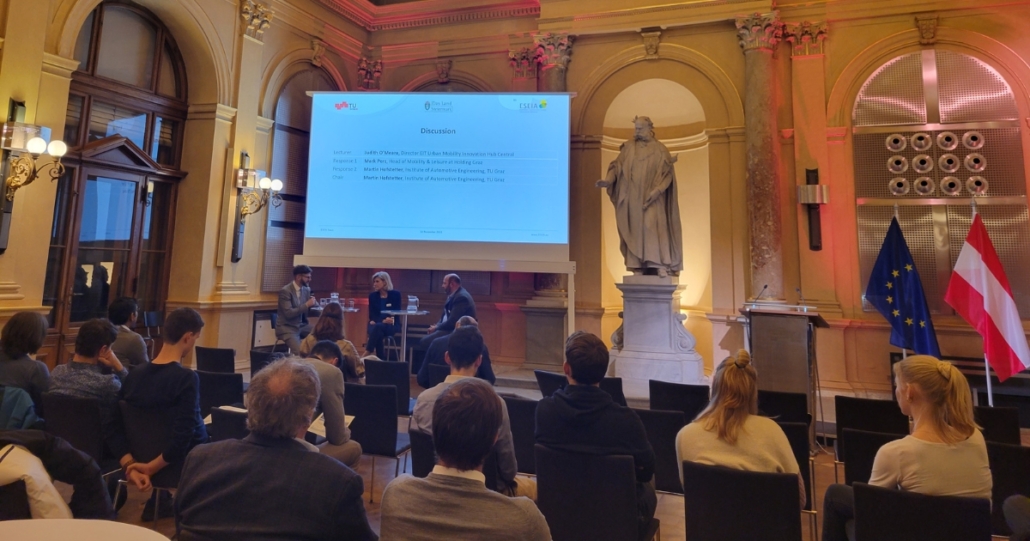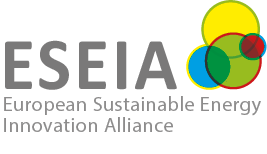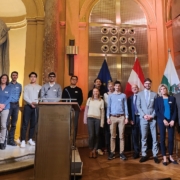ESEIA Lecture Series: Eighth Lecture Explores Smart Integration of Sustainable Mobility Solutions for Urban Areas
The eighth lecture in the ESEIA Lecture Series took place on 16 November 2023, welcoming 49 attendees from 10 countries to explore urban mobility and the pressing need for innovative solutions to make cities more sustainable.
Titled Smart Integration of Sustainable Mobility Solutions for Urban Areas, the eighth lecture took place at the Auditorium (Aula) of Graz University of Technology (TU Graz) from 19:00 to 21:00 CET, featuring the Director of EIT Urban Mobility Innovation Hub Central Judith O’Meara as a guest lecturer. Organised by ESEIA in cooperation with TU Graz and supported by the Styrian Government, this lecture is part of the hybrid series Sustainable Energy Innovation Systems for Climate Neutrality that has served as a forum for dialogue, bringing together different stakeholders to discuss climate-neutral solutions.
After the welcome statements delivered by the Professor at the Institute of Highway Engineering and Transport Planning at TU Graz Martin Fellendorf and the ESEIA Director Brigitte Hasewend, the Researcher at the Institute of Automotive Engineering at TU Graz Martin Hofstetter opened up the session by introducing the topic and the panel of speakers. The line-up included experts from different fields who touched upon various topics, from the challenges faced by cities and the impact of sustainable solutions on urban mobility to the role of innovation and continuous education in driving positive change:
- Judith O’Meara, Director of EIT Urban Mobility Innovation Hub Central;
- Mark Perz, Head of Mobility & Leisure at Holding Graz;
- Martin Hofstetter, Researcher at the Institute of Automotive Engineering at TU Graz.
“Mobility in cities needs to be fundamentally changed to fight the climate emergency”
Judith O’Meara started her presentation by highlighting the current global urbanisation trend. “Today, nearly 60% of the world’s population lives in cities,” she said, a proportion that is expected to increase to 80% by 2050. With the urban population on the rise, cities face increasing challenges on the path to sustainable mobility: the transportation sector accounts for ¼ of GHG emissions in Europe, and the largest share comes from individual motorised transport such as cars and motorbikes. Therefore, transport is a key sector that demands urgent decarbonisation efforts.
Then, she introduced the EIT Urban Mobility, an initiative of the European Institute of Innovation and Technology (EIT) engaged with more than 750 organisations in 33 countries across Europe, and explained how it helps solve the mobility challenges facing our cities by:
- Connecting private and public sector partners to access markets, talent, finance and knowledge;
- Fostering entrepreneurship through practical learning;
- Piloting market-ready solutions in cities;
- Boosting start-up growth for long-term impact.
During her presentation, Judith O’Meara shared examples of projects supported by EIT Urban Mobility. One of the examples was the Smart City Shuttle, a fully electric vessel developed by Hyke to modernize water public transport. “It is a nice example of how different sectors and actors need to work together to bring new solutions into the market,” she added.
In addition to intersectoral collaboration, Judith O’Meara emphasised the importance of promoting innovation and entrepreneurship education, providing an overview of the programmes offered by EIT Urban Mobility to train the next generation of urban mobility practitioners, which include Master School, Doctoral Training Network, Competence Hub, among others.

Following Judith O’Meara’s lecture, Mark Perz offered a glimpse into what urban mobility of the future in the Austrian city of Graz looks like. After a brief overview of Holding Graz’s line network – 85 trams, 173 buses and 740 drivers – he explained how the service company is investing in expanding the infrastructure and creating innovative mobility systems for the city. One of these systems is tim – täglich. intelligent. mobil. (daily.intelligent.mobile.) It is an integrated mobility offer that makes it possible to do without one’s vehicle thanks to its diverse services, with (e)-car sharing, rental cars or e-taxis at several tim locations.
Then, Martin Hofstetter took the stage to emphasise the importance of life-cycle assessment and lifelong learning as essential elements in developing sustainable solutions and driving green mobility transition. He also presented his research project aimed at the holistic optimal design and parametrisation of efficient electric drive systems for passenger vehicles, explaining how the new computer-based system design method helps to reduce costs and energy losses while contributing to sustainable and affordable e-mobility.
The Q&A session that followed the presentations allowed the participants to engage with the speakers, posing questions ranging from innovative solutions to social acceptance of these solutions and further exploring the topic of urban mobility.

Thank you to the speakers, the participants, the chair Martin Hofstetter, the host Martin Fellendorf, and all those who have contributed to bringing the last lecture of the autumn/winter 2023 semester to life!
The ESEIA Lecture Series will return on 18 April 2024 with the guest lecture titled Advanced Tools for Planning and Management of Climate Neutral Buildings, delivered by Building Energy Senior Researcher at the International Energy Research Centre (IERC) at Tyndall National Institute Carlos Ochoa. More information about the ninth lecture is available here. We look forward to your participation!
Contact:
ESEIA Team: office@eseia.eu


